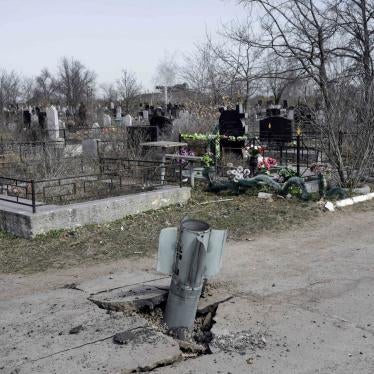Geneva, Switzerland
Thank you, Mr. Chairman. Human Rights Watch and other NG0s now involved in the Cluster Munition Coalition have been actively engaged since 2000 in promoting action on cluster munitions in the CCW. We have tried to be very constructive and concrete in our participation. Human Rights Watch, for example, has in the past put forward a draft CCW protocol on cluster munitions, we have distributed documents outlining eight essential elements toward a solution to the problems caused by cluster munitions, and we have provided commentary on various states’ proposals on the issue.
Regrettably, the CCW has repeatedly failed to deal adequately with cluster munitions. It failed at the Third Review Conference in November 2006, which then spurred the launch of the Oslo Process. It failed again at the Meeting of States Parties in November 2007, and, based on the current draft text, it is failing yet again in November 2008.
Anyone who believes that cluster munitions cause unnecessary harm to civilians, and who wants to deal urgently with the problem, will find that this is a wholly unacceptable draft text that can make no real humanitarian difference. In fact, it is counter-productive to the humanitarian objectives that are supposed to be driving this effort.
If this text remains largely as it stands, it will be sharply criticized by the NGO community, and we will strongly discourage states from agreeing to it. A protocol based on this text would not enhance the CCW’s reputation, but rather just the opposite. It would be harmful to the CCW, to international humanitarian law, and to global efforts to combat cluster munitions.
What is wrong with the text? Let me count the ways. First, the gigantic exception in Article 4 completely undermines the broad definition—and categorical prohibition—that has now been borrowed from the Convention on Cluster Munitions. The definition may as well not exist, since Article 4 riddles it with loopholes that will allow States to use some cluster munitions known to cause unacceptable harm for as long as they wish.
Second, the 13 to 20 year transition period makes a mockery of the notion of urgent and effective action to cope with the dangers posed to civilians by cluster munitions. Third, the text thus allows ongoing use for 13 to 20 years of all cluster munitions, even the oldest, most unreliable and inaccurate varieties.
Fourth, the one positive new aspect of international humanitarian law from the previous draft text—a prohibition on use in concentrations of civilians—has now been removed, thus permitting unfettered use. Fifth, the text allows ongoing production of cluster munitions. Sixth, it has very weak transfer restrictions that will do little to constrain trade.
Seventh, it allows stockpiling for an indefinite period. Indeed, not only is there no deadline for stockpile destruction, there is not even a definite requirement to destroy stockpiles of cluster munitions—ever. Eighth, the provisions on victim assistance are a step back from the standards of the Convention on Cluster Munitions. I will stop counting there, Mr. Chairman, although I could go on for some time longer enumerating problems with the draft text.
It is difficult to envision a text that is complementary to the Convention on Cluster Munitions emerging from this process. There are some elements that are positive, and we would encourage states to implement those immediately at the national level. Many measures can be accomplished more quickly, and can be stronger, if done nationally rather than through a future CCW protocol. These could include use restrictions, a ban or moratorium on production and trade, initiation of destruction of older models, and much more.
We very much desire to see positive movement on this issue by all states and hope that those who are not ready to sign the new Convention in Oslo in December will make progress at the national level, and not wait for doubtful or dubious success in the CCW.
We believe that no state that supports the Convention on Cluster Munitions should support this draft text. It undermines that Convention and the new standard of behavior that it represents. It legitimizes cluster munitions rather than stigmatizing them. We urge you not to agree to a new protocol based on this text, and if it does go forward, do not ratify it.
Thank you.






